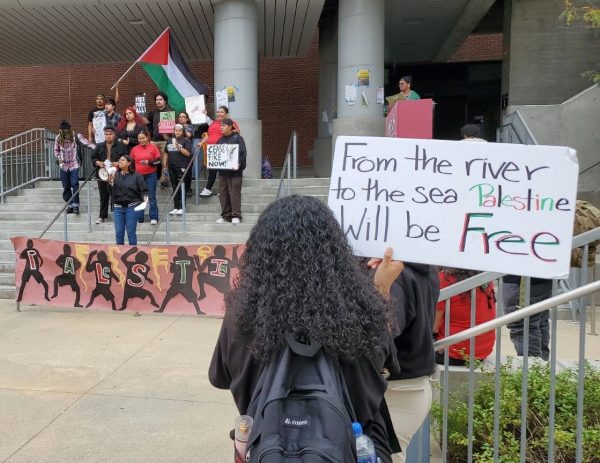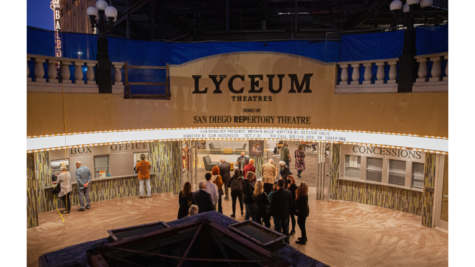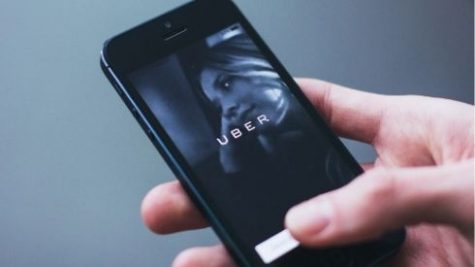Minimum wage is not enough
Fifty years ago, Martin Luther King died fighting against the oppression of workers. He was working on The Poor People’s Campaign; a campaign demanding economic and human rights for all, regardless of race.
To honor the anniversary of this fight, many events across the United States were held. But the reality is that the changes accomplished by Dr. King have not improved the lives of many workers.
According to an article in Socialistworker.org on Aug. 29: “The MLK of yesterday and today” by Nicole Bowmer, this anniversary celebration had a lack of connection with our fights; the speeches by priests and politicians made no demands in solidarity with local, national or international struggles.
On Aug. 29 in San Diego, fast food workers walked off their jobs to support the Fight for 15 campaign led by the Workers Organizing Committee in San Diego. Over 80 people picketed in front of a Wendy’s restaurant in Downtown San Diego motivated by a desire of economic justice.
Fifty-year-old Leobardo Meza walked out too, as a way to express his disagreement with the salary he earns at the fast food restaurant he works in. Meza has worked at the McDonald’s across from City College for more than six-years.
First he worked as a full time cashier for four years, but he said, “They never recognized my hard work.”
Meza said he had to remind his supervisors constantly that he had not taken a break yet: “I don’t feel my legs or my back,” and they would answer: “Oh, you need a break? Take it.”
Seeing these abuses; when he had the opportunity to be promoted as a manager, he decided he didn’t want to be like them, “almost with a whip in their hands exploiting workers.”
But when he demanded his right to take his10 minute breaks; management started to cut his hours, reducing them to only eight to 15 hours a week and changed his position from cashier to maintenance.
Taking into account that we live in the tenth most expensive city in the U.S.; earning only minimum wage in San Diego’s equals earning only poverty wages.
From earning only a little over $100 per week, no benefits and no sick days, a chain of unfortunate events changed Meza’s life.
He had to sell his car because he could not afford to pay insurance; the high cost of living in San Diego forced him to move his residence to Tijuana. He could not even afford having a cell phone.
As a way to make some extra money, Meza sells items he finds on the streets.
“I know that taking away hours from my work was a way to try to repress me, to retaliate against me,” says Meza. “I decided to walk out because, what else are they going to take away from me if they already cut my schedule to only eight hours per week.” He says this with a mix of sadness and impotence in his face. He knows that finding a new job is hard.
According to an article in the Union Tribune, on June 18, the number of people unemployed in San Diego grew by 9,800. The data was released by the Employment Development Department.
“Now if I ask for my break, the manager demands that I first finish cleaning the grease in the kitchen, or whatever I’m cleaning, before I take the break that by law, corresponds to my hours.”
Meza said that the managers ask them to smile while they work, “but how do they want us to smile if we suffer abuses at work?”
He adds that, “At my workplace there are many that would like to say what I’m saying, but the workers are always scared. They are afraid that if they say anything, they may lose their jobs. Bad employers keep us exhausted, and frightened, so we don’t have the energy to fight against these abuses.”
He said management constantly reminds workers that if they don’t want to do the work, there are more people waiting outside. Meza says that since there are many looking for any job, management always minimizes the job employees do.
By ignorance, people tend to think that if you are poor in the U.S. it is because you asked for it. But the reality is that to survive during this recession, workers are forced to run from job to job. They are trapped in a zone of low-wage-work: working in fast food restaurants, cleaning offices, cleaning hotel rooms, harvesting our food but always suffering economic hardship.
With low wages, their minds never stop thinking on how they are going to pay the rent next month. Workers are filled with stress and uncertainty.
Earning only minimum wage in San Diego is inhuman and ironically, in this recession corporations built their fortunes by taking advantage of workers in need. Service Industries in San Diego have been continued growth in many areas, including dining, thanks to the invisible and not appreciated labor of these workers.
A person I talked to at the picket told me that “The Fight for Fifteen will never happen.” He was obviously a person who has never had to work in such places earning only $8 an hour and whose body doesn’t ache like theirs after working two job-shifts only to bring home misery.
The picket was about dignity; the workers demand $15 an hour and the right to unionize. They have the vision that life can be different and better only if salaries are increased and they are ready to stop the widening gap between rich and poor.
As I was writing this article, Gov. Jerry Brown, has endorsed legislation to raise the minimum wage. Brown said in a statement that “The minimum wage has not kept pace with rising costs.” This increase will help workers and families that are struggling in this economy.
Politicians need to witness the worker’s anger; they need to understand the needs and understand why this Campaign For Fifteen is necessary. Many workers in San Diego live check to check, working everywhere we can, all day, but accomplishing almost nothing.
Meza ends saying: “We thought that by working very hard every day was enough to give our family a life with dignity, and that is not true. This is not personal; it’s against the company’s abusive politics against workers. Even when they only give me one hour, I won’t quit, I’m still going to work here; I haven’t done anything wrong for them to fire me.”
We need solidarity; we need to continue the fight that Dr. King started against income inequality.
We need to alleviate poverty regardless of race and gender; the low income workers are ready for the liberation from these miserable wages. It is inevitable, because the conditions of their lives are forcing them to fight for it.
Your donation will support the student journalists of San Diego City College. Your contribution will allow us to purchase equipment, cover the cost of training and travel to conferences, and fund student scholarships. Credit card donations are not tax deductible. Instead, those donations must be made by check. Please contact adviser Nicole Vargas for more information at [email protected].












